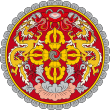
The Government of Bhutan has been a constitutional monarchy since 18 July 2008. The King of Bhutan is the head of state. The executive power is exercised by the Lhengye Zhungtshog, or council of ministers, headed by the Prime Minister. Legislative power is vested in the bicameral Parliament, both the upper house, National Council, and the lower house, National Assembly. A royal edict issued on April 22, 2007 lifted the previous ban on political parties in anticipation of the National Assembly elections in the following year. In 2008, Bhutan adopted its first modern Constitution, codifying the institutions of government and the legal framework for a democratic multi-party system.

"Druk Tsenden" is the national anthem of Bhutan. Adopted in 1953, the lyrics were written by Dolop Droep Namgay and possibly translated into English by Dasho Gyaldun Thinley. The accompanying music was composed by Aku Tongmi.

Jigme Singye Wangchuck is a member of the House of Wangchuck who was the king of Bhutan from 1972 until his abdication in 2006.
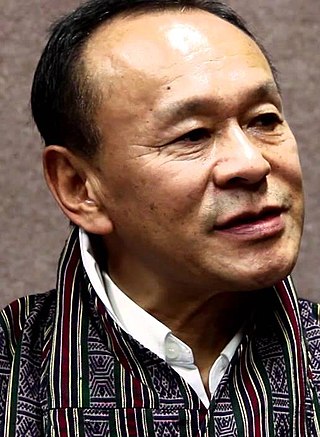
Lyonpo Jigme Yoser Thinley is a Bhutanese politician who was Prime Minister of Bhutan from 20 July 1998 to 9 July 1999, 30 August 2003 to 18 August 2004 and 9 April 2008 to 28 April 2013.
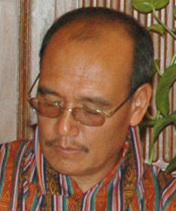
LyonpoYeshey Zimba was a political figure from Bhutan. He was Prime Minister of Bhutan two times: first from 2000 to 2001; then from 20 August 2004 to 5 September 2005. During this period, each minister took turns holding the chairmanship for one year.

Gross National Happiness, sometimes called Gross Domestic Happiness (GDH), is a philosophy that guides the government of Bhutan. It includes an index which is used to measure the collective happiness and well-being of a population. Gross National Happiness Index is instituted as the goal of the government of Bhutan in the Constitution of Bhutan, enacted on 18 July 2008.
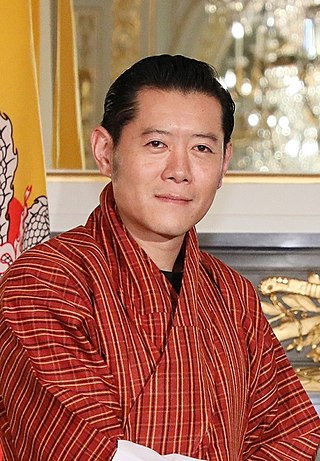
Jigme Khesar Namgyel Wangchuck is King of Bhutan. His reign began in 2006 after his father Jigme Singye Wangchuck abdicated the throne. A public coronation ceremony was held on 6 November 2008, a year that marked 100 years of monarchy in Bhutan.

The Council of Ministers is the highest executive body in Bhutan. It was created in 1999 by Jigme Singye Wangchuck, the fourth King of Bhutan.
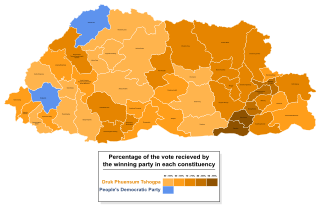
National Assembly elections were held in Bhutan for the first time on 24 March 2008. Two parties were registered by the Election Commission of Bhutan to contest the elections; Druk Phuensum Tshogpa, led by Jigme Y. Thinley, which was formed by the merger of the Bhutan People's United Party and All People's Party, and the People's Democratic Party (PDP). A third political party, the Bhutan National Party (BNP), had its application for the registration refused.

LyonpoKinzang Dorji is a two-time former Prime Minister of Bhutan from 2002 to 2003 and again from 2007 to 2008. He was the chairman of Royal Monetary Authority of Bhutan from 2007 to 2008.
Princess AshiKesang Choden Wangchuck, is a member of the royal family of Bhutan. She is a daughter of the fourth King of Bhutan Jigme Singye Wangchuck and Queen Mother Ashi Tshering Pem Wangchuck, one of the former king's four wives, all of whom are sisters and held the title 'queen consort'. She is a half-sister of the current Druk Gyalpo Jigme Khesar Namgyel Wangchuck, who became king following the abdication of his father Jigme Singye Wangchuck on 9 December 2006.
The development of Bhutanese democracy has been marked by the active encouragement and participation of reigning Bhutanese monarchs since the 1950s, beginning with legal reforms such as the abolition of slavery, and culminating in the enactment of Bhutan's Constitution. The first democratic elections in Bhutan began in 2007, and all levels of government had been democratically elected by 2011. These elections included Bhutan's first ever partisan National Assembly election. Democratization in Bhutan has been marred somewhat by the intervening large-scale expulsion and flight of Bhutanese refugees during the 1990s; the subject remains somewhat taboo in Bhutanese politics. Bhutan was ranked 13th most electoral democratic country in Asia according to V-Dem Democracy indices in 2023 with a score of 0.535 out of 1.
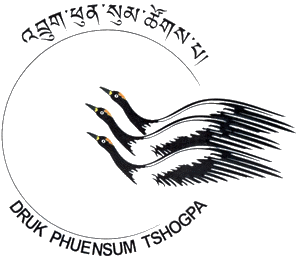
Druk Phuensum Tshogpa is one of the major political parties in Bhutan. It was formed on 25 July 2007 as a merger of the All People's Party and the Bhutan People's United Party, which were both short-lived. The working committee of the merged entity, headed by the former home minister, Jigmi Yoezer Thinley, decided on the name for the new party. On 15 August 2007, Jigmi Yoezer Thinley was elected president of the party, and the party applied for registration, thus becoming the second political party in Bhutan to do so. On 2 October 2007, the Election Commission of Bhutan registered the party. On 24 March 2008, the party won the first general election held in Bhutan. The party secured 45 of the 47 seats to the National Assembly. The party tends to be more popular in the east of the country.
The Bhutan People's Unity Party, also called Druk People's Unity Party (PUP), is a former Bhutanese political party. It was founded by regional and national cadres serving in Bhutan's pre-democratic government. Led by former minister (assemblyman) Yeshey Zimba, BPUP then merged with the stronger All People's Party (APP), headed by former and future prime minister Jigme Y. Thinley; the two parties unified as the Druk Phuensum Tshogpa on 25 July 2007. Both the BPUP and APP had been registered with the Election Commission.
The following lists events that happened during 2011 in Bhutan.
The following lists events that happened during 2009 in Bhutan.

Alak Jigme Thinley Lhundup or Alak Jigme Lhundup Rinpoche was a Tibetan Tulku, as well as the former speaker of the Tibetan Parliament in Exile and former Minister with the exile Tibet administration.

LyonpoSonam Tobgye is an eminent jurist from Bhutan. He served as Chief Justice of the High Court of Bhutan from 1991 through 2009 and as Chief Justice of the newly created Supreme Court of Bhutan from 2010 through 2014. He also served as president of SAARCLAW, the South Asian Association for Regional Co-operation in Law, from 2011 through 2014. His public service spanned 43 years, beginning as master of household to King Jigme Dorji Wangchuck and ending in constitutionally-mandated retirement at the age of 65.
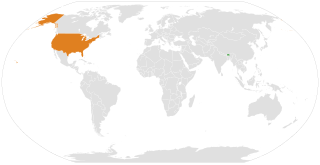
Bhutan and the United States have no formal diplomatic relations, but relations between the two nations are viewed as "friendly and close", due to shared values between the two countries. The increasingly close relationship between India and the U.S. has also helped to improve U.S.–Bhutanese relations.

Bhutan–Spain relations are the bilateral relations between Bhutan and Spain.


































